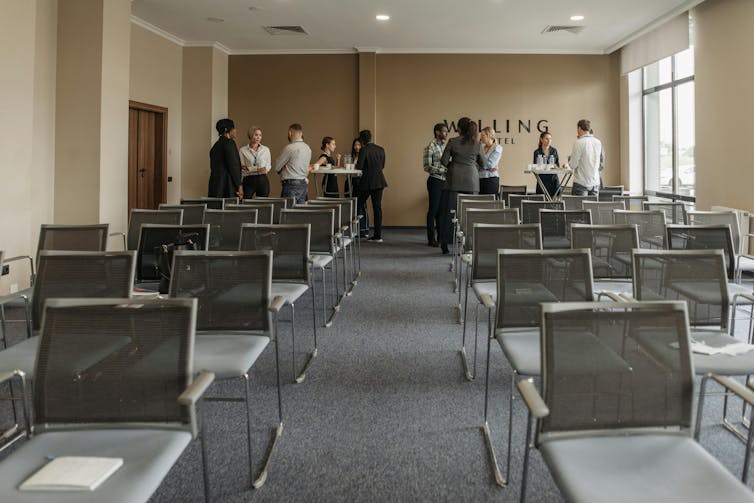Rupa Banerjee, Toronto Metropolitan University
For the first time in nearly 30 years, a majority of Canadians believe there is too much immigration, with international students becoming a focal point of public scrutiny.
A 2024 survey by the Environics Institute showed that only 27 per cent of Canadians view international post-secondary students as a high priority among immigration categories. International students are often portrayed as both exploited and fraudulent and blamed for housing shortages and strained infrastructure.
In January 2024, the federal government responded by reducing international student permits by 35 per cent. It also restricted the Post-Graduation Work Permit Program to limit the number of students eligible to work after graduation. In September, further cuts were announced for 2025 and 2026, reflecting growing political pressure to address public concerns.
The government’s recent caps and cuts may ease public concerns about housing and infrastructure. But these risk harming Canada’s reputation as a welcoming destination for global talent. Policies need to find a balance, valuing students not just as economic contributors but as individuals with dreams and resilience.
This requires acknowledging that international students’ experiences vary widely by field of study, level of education, connections in Canada and family resources. Now more than ever, it is essential to understand the diverse experiences of international students, including those of recent university graduates. Treating all international students as a monolith misses their unique challenges and opportunities.

Unique challenges
International students face unique challenges not only during their studies, but also after graduation. Those who manage to attain permanent resident status are confronted with significant hurdles in the labour market.
Research shows that while international student graduates earn more than immigrants educated abroad, they remain disadvantaged in the labour market relative to Canadian-born graduates.
The public debate tends to focus on college students. International university students, despite being the majority of international students in Canada, are either lumped in with their college counterparts or overlooked altogether.
But international university students are different from their college counterparts. Universities typically have more challenging entry requirements, including higher academic standards, more expensive tuition fees and longer degree programs.
However, according to Statistics Canada, international college graduates tend to achieve better early earnings outcomes relative to Canadian-born graduates. International university graduates face larger initial earnings gaps, but these gaps narrow over time. International college and university students have distinct journeys that warrant separate examination.
Complex migration journeys
A recent working paper I authored with colleagues focuses on the complex migration journeys of international graduates from Canadian universities, capturing the diverse factors that shape their experiences and decisions.
We conducted 36 in-depth interviews between July 2022 and April 2023 with international graduates from Canadian publicly funded universities who held post-graduation work permits. Participants, recruited through alumni groups and networks, completed bachelor’s, master’s, professional or doctoral degrees across diverse fields, including film production, business and engineering. They represented 23 countries, with most from Iran, China and India. The majority had attained permanent residency and were living in Canada, while 10 had left after graduation.

Interviewees described paths influenced by personal goals, systemic barriers and shifting opportunities. Many said they felt compelled to accept unpaid internships or other exploitative jobs to gain Canadian experience. We heard about daily interactions, particularly in service-oriented jobs, where disrespectful and discriminatory behaviours from customers towards employees with foreign accents, or racialized people, were common.
Fluid journeys, changing circumstances
Participants in our study described their migration journeys as fluid, not linear, shaped by changing circumstances.
For some, studying in Canada was part of a broader strategy to position them to pursue opportunities in different countries as they arose. For others, financial or legal barriers limited their options, leaving them unable to depart Canada even when they would prefer to. Their stories highlight the uncertain and constantly fluctuating nature of international student migration.
Understanding the experiences of international university students requires a framework that combines aspirations and capabilities. Aspirations reflect students’ personal and family goals, shaped by culture and societal expectations. Capabilities include the resources and opportunities — such as finances, education, skills and host country conditions that enable them to pursue these goals. Together, these factors determine what students aim for and what they can realistically achieve.
Privileges and precarity
Some interviewees arrived in Canada with financial resources and family support, allowing them to manage the high costs of education and living expenses. Others, however, took on substantial debt to finance their studies, reflecting their willingness to invest in future opportunities despite economic risk. While privilege granted access to education, and the potential for permanent residency status, their success was often constrained by precarity, including financial instability, cultural adjustment challenges, legal uncertainties and discrimination.
While students’ advantages can foster success, barriers — including unpredictable immigration systems, lack of professional networks, limited opportunities to gain relevant Canadian work experience and discriminatory treatment — often undermine them. Recognizing this tension is essential to understanding the varied experiences of international students in Canada.

Collaboration needed
Solving these challenges requires collaboration across education, immigration and employment systems. Universities must provide better support, such as work-integrated learning opportunities that connect education to careers. Immigration policies must become more transparent and predictable. Employers need to recognize their role in addressing hiring barriers and creating pathways for international graduates to gain meaningful work experience.
Finally, appropriate settlement services are key to helping international students build long-term futures in Canada. Many of our interviewees started their journeys excited to study, settle and eventually become part of Canadian society.
But along the way, barriers like precarious work, limited career options and immigration challenges often left them disillusioned, even after getting permanent residency. With the right supports, these graduates could navigate those hurdles more easily and stay engaged in their goals — finding meaningful work, putting down roots and contributing to their communities for the long term.
This is a pivotal moment to rethink how Canada views and supports international students. Without adequate policies and services to support their long-term success, many are at risk of leaving Canada, taking their skills, education and potential economic contributions elsewhere.
Ensuring that these graduates feel valued and supported is essential for retaining talent and strengthening Canada’s competitive position in the global race for skilled workers.
Rupa Banerjee, Canada Research Chair and Associate Professor of Human Resource Management and Organizational Behaviour, Toronto Metropolitan University
This article is republished from The Conversation under a Creative Commons license. Read the original article.











